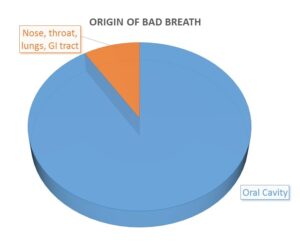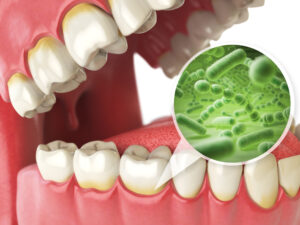What Can I Do to Have Fresh Breath?
Today is National Fresh Breath Day, and it goes without saying that everyone wants to have fresh breath! Bad breath is a problem that can affect your relationships with loved ones, friends, and colleagues at work. You can take these steps to make sure you have fresh breath today and every day!
What Causes Bad Breath?
 The primary cause of bad breath is bacterial in nature. Wherever there is an accumulation of bacteria, there is likely to be a bad odor. Over 90% of bad breath originates inside the oral cavity, with the remaining <10% coming from either the nasal passages, lungs, or digestive tract.
The primary cause of bad breath is bacterial in nature. Wherever there is an accumulation of bacteria, there is likely to be a bad odor. Over 90% of bad breath originates inside the oral cavity, with the remaining <10% coming from either the nasal passages, lungs, or digestive tract.
Many of the bacteria in the mouth produce bad-smelling gases called Volatile Sulfur Compounds (or VSCs). The aim of bad breath treatment is to remove these bacteria and prevent continued buildup.
How Can I Maintain Fresh Breath?
By following these steps, you can minimize the amount of bacteria in your mouth and reduce the risk of bad breath.
See a Dentist Regularly
One of the most important ways to prevent large accumulations of bacteria in the mouth is by seeing your dentist regularly. When you have professional teeth cleanings with your dental hygienist on a consistent basis, you get a “clean slate”. The professional teeth cleaning removes any collections of bacterial buildup in the form of soft plaque and hard tartar from the teeth. After each professional teeth cleaning, breath is noticeably fresher!
Dental visits are also important for catching potential bad breath problems like gum disease and cavities . . . which leads us to the next step in keeping fresh breath.
Treat Any Active Dental Problems
Both gum disease and cavities involve accumulations of bacteria. When gum disease progresses to the point of deep pocketing around the teeth, those pockets are perfect hiding spots for bacteria. You cannot reach into the pockets to clean them out with simple brushing and flossing. Only professional dental treatment can accomplish this.
The same is true for cavities. As bacteria penetrates into a tooth, destroying the enamel and underlying dentin, it leaves soft decaying material in its wake. Covering over the decay will not remove the bad smell. Only dental treatment that can clean out the affected tooth structure will remove the bacteria and the bad odors it causes.
Commit to Great Oral Hygiene at Home
 In between your dental visits, it is your job to remove dental plaque. The hygienist has presented you with a clean slate, a mouth free of bacterial buildup. When you commit to great oral hygiene, you can keep it clean.
In between your dental visits, it is your job to remove dental plaque. The hygienist has presented you with a clean slate, a mouth free of bacterial buildup. When you commit to great oral hygiene, you can keep it clean.
Great oral hygiene must include brushing twice a day (preferably after breakfast and before bed), flossing every night, and using an antiseptic or anticavity mouthwash. When you skip parts of your oral hygiene routine, dental plaque builds up and increases the amount of bacteria in your mouth. More bacteria produce more gases, which makes you more likely to have bad breath.
Add a Tongue Cleaner to Your Routine
Some people collect dental plaque, containing bacteria, at the back of the tongue in deep pits and grooves. Tongue anatomy varies from person to person, so some people will have a greater chance of collecting bacteria. A gentle tongue cleaner can help you remove this dental plaque and the odor-causing bacteria it contains.
It is extremely important that you use something flexible and gentle to clean the delicate soft tissue of the tongue. We frequently see injuries from patients using aggressive tools or methods to attempt cleaning the tongue. Plaque is soft and requires very little force to remove it. A flexible tool will do the job.
Use an Alcohol-Free Mouthwash that Fights Bad Breath
The first important point is that you must use an alcohol-free mouthwash to fight bad breath. Alcohol is a prominent ingredient in many over-the-counter and prescription mouthwashes because it is a good solvent (carrier solution) for the active ingredients. The problem is that alcohol has a drying effect, and a dry mouth attracts more bacteria. Always choose alcohol-free!
There are specific formulations that fight the bacteria or the smelly compounds they produce. A few noteworthy brands are BreathRx, TheraBreath, SmartMouth and ProFresh. Each contains an active ingredient that should kill bacteria and/or break down sulfur gases.
Chew Sugar-Free Gum between Meals
Many people chew gum to improve their bad breath, assuming that a strong minty flavor will cover the odor of their breath. Unfortunately, this is not true. What is true is that chewing sugar-free gum stimulates the production of saliva, and saliva is GOOD for you. Saliva fights bacteria and plaque buildup. Chewing gum is a way of returning your mouth to a healthy state after eating and drinking, especially if you do not have time to brush or floss.
Fight Dry Mouth
Some people suffer from dry mouth as a side effect of prescription medication or damaged salivary glands. Whatever the cause of dry mouth, the result is always an increase in bacterial buildup in the mouth. Dental plaque loves a dry mouth. Most people with dry mouth have bad breath.
When you fight your dry mouth, you also fight the bacteria that cause bad breath. In addition to chewing gum between meals, you should commit to drinking plenty of water. Many over-the-counter products can help you moisturize your mouth, like Biotene brand products. You can keep the spray handy throughout the day and use a gel to coat the inside of the mouth before bed.
What If I Do All of These Things, and My Breath is Still Bad?
 If you are consistently doing all of these things and still struggle with bad breath, the cause could be outside of the mouth. Once Dr. Ann has performed a thorough evaluation and ruled out any dental problems that could contribute, she will discuss the other possibilities. This may involve a referral to an ENT or GI specialist to search for chronic sinus infections or severe acid reflux, among other things.
If you are consistently doing all of these things and still struggle with bad breath, the cause could be outside of the mouth. Once Dr. Ann has performed a thorough evaluation and ruled out any dental problems that could contribute, she will discuss the other possibilities. This may involve a referral to an ENT or GI specialist to search for chronic sinus infections or severe acid reflux, among other things.
More Questions about Bad Breath?
Call Designer Smiles today to schedule a consultation with Dr. Ann. She will perform a thorough evaluation of your mouth and help you determine the cause of your bad breath. Then she will work with you to develop a plan to remove those causes and get you on the road to fresh breath.
